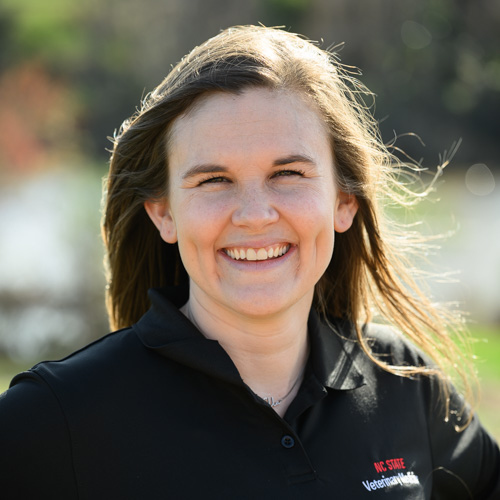Zoological and Lab Animal
Species Priority Area
Overview
The Zoological and Laboratory Animal Health Species Priority concentrates on preparing students for career readiness in Zoological Medicine or Laboratory Animal Medicine.
Zoological Medicine is the broad term used to encompass the practice of medicine and surgery in nontraditional species. It includes a number of different areas, including exotic animal private practice, aquatic animal medicine, wildlife medicine, and zoo practice zoological pathology and clinical zoo medicine. Zoological Medicine combines many elements of veterinary medicine, including preventative medicine, clinical medicine and surgery, pathology, clinical ecology, regulatory compliance, facilities and personnel management, and research.
Zoological Medicine veterinarians find work in private practice, governmental agencies, non-government organizations, non-profit organizations, academia and even industry, and have responsibilities for a wide variety of species. ZM veterinarians can enter the field through several routes including. Veterinarians offering clinical management of privately owned zoological species or for smaller zoological institutions may enter practice directly after DVM training. Specialists seeking to serve larger zoological institutions, government agencies, large NGO’s or academia typically receive post-DVM education, either through various combinations of internship(s)/residency and/or research training in MPVM, MS or Ph.D. programs.
Exotic animal veterinarians (or zoological companion animals) can work in zoological institutions, private zoological facilities, private practice or academia. Species worked on tend to range but are typically small to medium sized animals.
Board Certification is available in Zoological Medicine through the American College of Zoological Medicine (ACZM, currently offered at NCSU CVM), European College of Zoological Medicine (Zoo Health Management) (ECZM ZHM). For individuals preparing for private practice options that emphasize avian, reptile and amphibian, fish practice, or exotic mammal medicine, Board Certification is also available through the American Board of Veterinary Practitioners in those species defined specialities. Residency training positions can be very competitive and, therefore, good planning and preparation is important during the vet school years. Veterinarians can also become board certified through ACZM without a residency.
Zoological Medicine is a sufficiently broad career path that veterinary students should be careful to avoid too much specialization; it is arguably the ultimate mixed animal practice. Animal handling of a variety of species, clinical skills, and pathology are all important. Research, both basic and clinical, is an important component of Zoological Medicine
Laboratory Animal Medicine (LAM) is a specialty that combines many elements of veterinary medicine, typically including clinical medicine, surgery, pathology, regulatory compliance, facilities and personnel management and research. Similar to Zoological Medicine, LAM encompasses a variety of species and models. LAM veterinarians are employed in academia, industry (e.g., pharmaceutical) and government.
LAM specialists typically receive training in a post-DVM residency/postdoctoral program, although there is an alternative path to board eligibility. Training programs last two to three years (or more with additional research exposure and/or graduate degree), and may occur either immediately after the DVM or following practice or other experience; an internship is not required. Residency training positions can be competitive; therefore, good planning and preparation are important during the vet school years.
LAM is arguably the ultimate mixed animal practice. Animal handling and clinical skills in a variety of species is important preparation for a career in LAM. Research is at the heart of LAM, even if the lab animal vet is not directly engaged in his/her own research program. Veterinary students interested in LAM should obtain research experience, but also consider developing strengths in other related areas such as pathology, surgery and large animal or special species husbandry and medicine. Effective written and oral communication skills are also an essential component of LAM.
Year 1-3 Requirements
Required Courses
There are no required electives or selectives for this species priority.
Recommended Courses
Electives
- VMC 921: Special Topics in Zoological Medicine
- VMC 923: Research in Zoological Health
- VMC 928: Topics in Wild Reptile Medicine
- VMC 929: Topics in Wild & Managed Carnivore Medicine & Management
- VMC 912: Introduction to Zoological and Laboratory Animal Medicine I
- VMP 986: One Health – Philosophy to Practice
- FW 730: Ethics in Fisheries and Wildlife Sciences
- CBS 817: Advanced Topics in Zoological Medicine I
- CBS 818: Advanced Topics in Zoological Medicine II
Third Year Core Electives
- VMC 934: Zoological and Laboratory Animal Medicine
Selectives
- VMC 991: Advanced Herptile Medicine
- VMP 991: Pathology of Wildlife and Zoo Species
- VMC 991: Advanced Fish Medicine
- VMC 991: Invertebrate Medicine
- VMC 991: Marine Mammal
- VMC 991: Small Mammal Medicine and Surgery
- VMC 991: Honeybee Medicine
- VMC 992: Extramural Experience in Lab Animal Medicine
- VMC 992: Active Learning in the VH – Lab Animal Medicine
Year 4 Requirements
- Core Rotations
- Six four-week core rotations
- Diagnostic Concentration
- Anesthesia
- Internal Medicine
- Primary Care
- Surgery
- Urgent/Emergency Care
- Two two-week core rotations:
- Population Medicine/Shelter Medicine/Epidemiology
- Non species priority medicine/primary care/surgery
- Six four-week core rotations
- Elective Rotations
- Nine two-week elective rotations determined by species priority leaders







